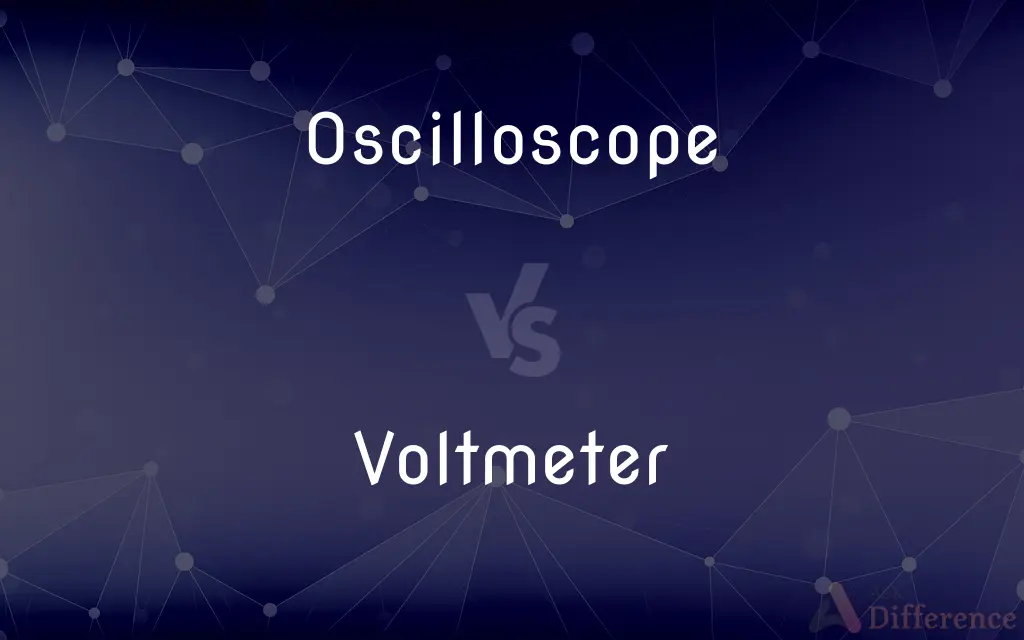Oscilloscope vs. Voltmeter — What's the Difference?
By Tayyaba Rehman & Fiza Rafique — Updated on March 25, 2024
An oscilloscope visualizes electrical signals over time, allowing waveform observation; a voltmeter measures voltage levels between two points directly, focusing on magnitude.

Difference Between Oscilloscope and Voltmeter
Table of Contents
ADVERTISEMENT
Key Differences
An oscilloscope is a tool used to display and analyze the waveform of electrical signals, showing how these signals change over time. It provides insights into the performance, frequency, and noise in electrical circuits. On the other hand, a voltmeter is specifically designed to measure the electrical potential difference between two points in a circuit, delivering a numerical voltage value without visualizing the signal's waveform.
While an oscilloscope can offer a broad range of measurements including voltage, frequency, phase, and time intervals through its graphical display, a voltmeter provides precise and direct measurements of voltage levels. This makes voltmeters particularly useful for simple diagnostic and maintenance tasks where waveform information is not necessary.
Oscilloscopes are indispensable in the fields of electrical engineering and electronics for troubleshooting and designing circuits due to their ability to display dynamic changes. In contrast, voltmeters are more commonly used in both professional settings and by hobbyists for quick voltage checks and basic electrical tasks.
The versatility of an oscilloscope comes at a higher cost and complexity, requiring users to have technical knowledge to interpret the displayed waveforms accurately. Voltmeters, however, are more straightforward to use and are available at a lower price point, making them accessible to a wider audience.
An oscilloscope's ability to visually represent electrical signals allows for the analysis of complex behaviors in electronic components and circuits, such as oscillations and noise. Meanwhile, a voltmeter's utility lies in its simplicity and direct approach to measuring voltage, which is sufficient for many practical applications.
ADVERTISEMENT
Comparison Chart
Primary Function
Visualizes electrical signals over time
Measures voltage levels directly
Display
Graphical waveform
Numerical value
Usage
Analysis of signal behavior and circuit troubleshooting
Basic electrical measurements and diagnostics
Complexity
High, with a steep learning curve
Low, easy to use
Cost
Generally more expensive
More affordable
Compare with Definitions
Oscilloscope
A device that graphs electrical signals as they vary over time.
Engineers use an oscilloscope to analyze the performance of an audio amplifier.
Voltmeter
Available in analog or digital formats.
Modern voltmeters are mostly digital, offering more accuracy.
Oscilloscope
Offers a visual representation of frequency, voltage, and time.
Oscilloscopes are used to check the frequency response of a new circuit design.
Voltmeter
Directly displays voltage in volts.
The voltmeter read 12V across the terminals.
Oscilloscope
Can measure multiple electrical properties.
An oscilloscope can simultaneously display voltage levels and waveform distortions.
Voltmeter
An instrument for measuring electrical potential difference between two points.
A voltmeter confirmed the battery's charge level.
Oscilloscope
Essential for observing signal integrity and troubleshooting circuits.
Oscilloscopes help identify noise in power supplies.
Voltmeter
Portable and easy to use for quick measurements.
A voltmeter is a handy tool for checking outlet voltage.
Oscilloscope
Useful in educational settings for demonstrating electrical principles.
Physics classes use oscilloscopes to teach students about wave properties.
Voltmeter
Essential in basic electrical troubleshooting and maintenance.
Electricians use voltmeters to find breaks in circuits.
Oscilloscope
An oscilloscope, previously called an oscillograph, and informally known as a scope or o-scope, CRO (for cathode-ray oscilloscope), or DSO (for the more modern digital storage oscilloscope), is a type of electronic test instrument that graphically displays varying signal voltages, usually as a calibrated two-dimensional plot of one or more signals as a function of time. The displayed waveform can then be analyzed for properties such as amplitude, frequency, rise time, time interval, distortion, and others.
Voltmeter
A voltmeter is an instrument used for measuring electric potential difference between two points in an electric circuit. It is connected in parallel.
Oscilloscope
An electronic instrument that produces an instantaneous trace, displayed on a screen, that corresponds to oscillations of voltage and current.
Voltmeter
An instrument for measuring electric potential differences in units of volts.
Oscilloscope
An electronic measuring instrument that creates a visible two-dimensional graph, on a screen, of one or more continuously varying voltages or currents.
Voltmeter
An instrument for measuring electric potential in volts.
Oscilloscope
An electronic measuring instrument which provides a visual representation of the time variation of electrical quantities, such as voltage or current. It may be used to measure the shape of a voltage pulse or the frequency of an oscillating voltage. It can also be used to measure properties of other physical variables, such as sound or light intensity, if they can be translated into electrical voltage or current.
Voltmeter
An instrument for measuring in volts the differences of potential between different points of an electrical circuit.
Oscilloscope
Electronic equipment that provides visual images of varying electrical quantities
Voltmeter
Meter that measures the potential difference between two points
Common Curiosities
Can you use an oscilloscope for all the functions of a voltmeter?
While an oscilloscope can measure voltage and offer more insights, it may not replace a voltmeter for quick and simple voltage checks due to its complexity and setup time.
Is a voltmeter or oscilloscope better for beginners?
A voltmeter is generally better for beginners due to its simplicity and direct readings.
Can an oscilloscope measure voltage like a voltmeter?
Yes, an oscilloscope can measure voltage, but it provides a waveform display rather than just a numerical value.
Why would you use an oscilloscope instead of a voltmeter?
An oscilloscope is used when you need to observe the shape and timing of electrical signals, not just measure voltage.
Are oscilloscopes portable?
Many modern oscilloscopes are portable, though traditionally they were larger and less so than voltmeters.
What is the main advantage of a digital oscilloscope?
Digital oscilloscopes offer more precise measurements, storage capabilities, and advanced analysis features compared to analog models.
Can oscilloscopes display multiple signals at once?
Yes, most oscilloscopes can display multiple channels and compare signals simultaneously.
How do oscilloscopes and voltmeters differ in accuracy?
Voltmeters are usually more accurate for voltage measurements, while oscilloscopes provide a visual representation with relative accuracy.
Do oscilloscopes measure current?
Indirectly, oscilloscopes can measure current by observing voltage across a known resistance.
Why are voltmeters essential in electrical work?
Voltmeters provide essential information about the electrical potential in circuits, crucial for diagnostics and safety.
How do you choose between an oscilloscope and a voltmeter?
The choice depends on the task: use a voltmeter for simple voltage measurements and an oscilloscope for in-depth signal analysis.
Can a digital voltmeter measure AC voltage?
Yes, many digital voltmeters can measure both AC and DC voltage.
Are there oscilloscopes with built-in voltmeter functions?
Many oscilloscopes offer integrated measurement functions, including voltage, making them versatile tools.
How does the cost compare between oscilloscopes and voltmeters?
Oscilloscopes are generally more expensive due to their complex functionality and features.
Can voltmeters be used for high voltage measurements?
Specialized high voltage voltmeters are designed for such measurements, but standard voltmeters have limitations on the voltages they can safely measure.
Share Your Discovery

Previous Comparison
Tortelli vs. Ravioli
Next Comparison
Integrated vs. HolisticAuthor Spotlight
Written by
Tayyaba RehmanTayyaba Rehman is a distinguished writer, currently serving as a primary contributor to askdifference.com. As a researcher in semantics and etymology, Tayyaba's passion for the complexity of languages and their distinctions has found a perfect home on the platform. Tayyaba delves into the intricacies of language, distinguishing between commonly confused words and phrases, thereby providing clarity for readers worldwide.
Co-written by
Fiza RafiqueFiza Rafique is a skilled content writer at AskDifference.com, where she meticulously refines and enhances written pieces. Drawing from her vast editorial expertise, Fiza ensures clarity, accuracy, and precision in every article. Passionate about language, she continually seeks to elevate the quality of content for readers worldwide.














































